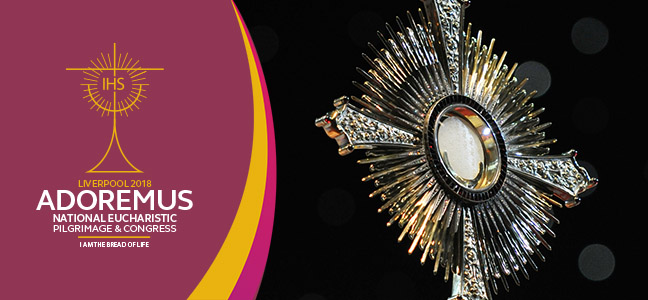In the second of three parts, Fr Mark Vickers reviews the events of the Congress, which took place on the second day, pointing out the many riches explored in the keynote addresses, testimonies and liturgies.
The second day was the Congress Day. It was an early start for Morning Prayer and Mass at the Metropolitan Cathedral celebrated by Bishop Richard Moth. A quick stop for breakfast, and it was down the hill through the ubiquitous rain. No chance this morning of a front row seat. Thousands of Catholics filled the Echo Arena. Again we were welcomed by Bishop Robert Byrne and Archbishop Malcolm McMahon. This time also by the Apostolic Nuncio, who read Pope Francis’s letter of greeting reminding us of our martyrs’ witness in their devotion to the Mass. Encouraging us that ‘past glories are a beginning not an end,’ the Holy Father urged us to be faithful to the Mass and in our practical service of the needy.
Given his international apostolate, Bishop Robert Barron required no introduction. The Mass, he reminded us, is the privileged encounter with Jesus Christ. Yet more than 80% of Catholics stay away from the Mass, and many Mass-going Catholics fail to appreciate the great treasure which is ours. And so, the Bishop walked us through the Mass. No part of the Mass is superfluous or without meaning. The Liturgy of the Word: God is a Person who speaks to us. The narrative of modernity is that the only story we have is the one we make up for ourselves. If this were true, how sad and diminishing it would be. Infinitely more interesting, we are part of God’s great story of creation and salvation. In the Liturgy of the Word, let us converse with the Word of God.
We moved on to the Liturgy of the Eucharist. The Bishop reminded us that God does not need sacrifice. Rather, by acts of sacrifice, we become rightly ordered, and how necessary that is. We are the ones who benefit from worship. No one in Scripture encounters God without subsequently being sent. That is true of the Mass: being ‘Christified’ in the Mass, we are sent out to ‘Christify’ the world. We are told no one today can focus on the spoken word for more than a few minutes. Bishop Barron spoke for an hour, and everyone was willing him to continue.
It was a hard act to follow, but Youth 2000 rose to the challenge. No one present in the Echo Arena remained unmoved by the joyful testimonies of these young people as they told how their lives had been transformed by encountering Christ in the Eucharist. It was the experience of being ‘met with total love’ which led to the ‘desire to be saints.’
If we had wanted Bishop Barron to continue before lunch, our wish was granted in the afternoon. His second talk dwelt on sanctity, the practical path to holiness. Captivated by his compelling mix of image, anecdote and humour, we appreciated why Bishop Barron is one of the great communicators of our age. Philosophy, St Thomas Aquinas and the Beatles were all placed at the service of the Gospel. That path to sanctity is threefold: finding Christ as the centre of our life; knowing that we are sinners; and realising that our life is not about us. All of us can benefit from listening (again) to Bishop Barron’s talks (the link is given below).
Next an hour of drama, testimonies and talks. Again, much to reflect upon. I found most poignant the input from Magnus Macfarlane-Barrow, founder of Mary’s Meals. Does Adoration have any practical application? Magnus recalled how his parents, after a pilgrimage to Medjugorje, turned their home into a Catholic retreat centre and were given permission to reserve the Blessed Sacrament. It was the experience of regular Adoration and Mass which transformed lives and enabled him and others to develop the charity which today feeds 1.2 million children across the world. He recounted too how often he sees Adoration sustaining those on the frontline in difficulty and danger. The world needs Adoration.
There had been a lot of talking, so much to absorb. It was with relief, therefore, that we came to Vespers, silent Adoration and Benediction. The whole hierarchy processed on to the sanctuary. So too did the statue of Our Lady of Walsingham on this her birthday. The Cardinal drew us into prayer with his reflection, not shying away from referring to the pain caused by the abuse scandals. Before the Blessed Sacrament, he pleaded: ‘I come as a beggar seeking forgiveness.’ He exhorted us: ‘There is no true mission in the Church which does not start here in prayer before the Lord.’ And so he led us into the purpose of the Congress, loving Adoration of our Saviour.
Simultaneously with the main event, the Adoremus Youth Congress ran elsewhere in the Convention Centre. The Archdiocese of Liverpool also put together over the weekend a Parallel Programme of events across the city. Such was the intensity of the schedule, however, I wondered how many delegates were able to take advantage of this.
I could only attend ‘Nightfever’ in the Blessed Sacrament Shrine facilitated, among others, by the team from St Patrick’s, Soho Square. Here was further proof, if needed, that Adoration is neither the preserve of the elderly nor an irrelevant devotion: a church packed to overflowing with the young, praying and singing in the presence of Jesus in the Blessed Sacrament. Those engaged in street evangelisation brought in a continual stream of passers-by, many of them wounded by the misfortunes of life. Immediately, I was grabbed to hear Confessions, many of them very powerful. There could be no better ending to the day. Here was the practical face of Adoration: the mercy of Jesus encountered in the Eucharist.
You can listen to most of the talks given at the Eucharistic Congress at http://catholicnews.org.uk/Home/Special-Events/Adoremus-National-Eucharistic-Pilgrimage.
For the first article of this three part series, click here.




